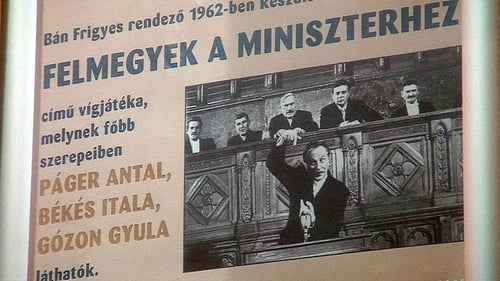
A comedy about the organisation of agricultural co-operatives. In the village of "Rendes", everybody has already entered the co-op, only the stubborn farmer, Bódog Balogh continues to resist. The leadership plays all their tricks and uses all their efforts, but all in vain.

The film is a ballad about the dwellers of a block-of-flats in Angyalföld.

Gráci has been recently released from a reformatory school. His old gang would like to involve him in a new action, but he hesitates. His past record is bad enough already, and he would not like to get into new trouble.

October, 1956. Colonel lieutenant Szabó sends a platoon with the mission of calming the people demonstrating in the town. The platoon is lined up under the command of Lieutenant Csendes and the soldiers aim at the demonstrators. Szusza Kis changes sides, and Csendes is unable to shoot at his childhood mate. They withdraw.

Stable servant
The spring of 1919. Karikás Frigyes reorganises brigade 39 at the Tisza. His most devoted soldiers are Korbély János and his followers, who remain faithful to the political commissioner under all circumstances.

On New Year's Eve in 1956 the artist couple, the actor János and the dancer Viki are hastily packing. While they are waiting for the car, which is to take them across the border, their entire life is replayed in front of their eyes.

Ádám Ülkei
A simple, religious Hungarian woodcutter lives with his wife and boy child with a small community of squatters among the peaceful mountains of Transylvania until a lumber company claims their land and forces them all to become company workers or else leave the land. This 1942 Hungarian film takes a detailed and unflinching look at the hardships of mountain living, and the realistic approach proved influential to the Neorealist movement in Italian cinema. Hungarian master director Istvan Szots won the Biennale Cup at the Venice Film Festival for his auspicious debut, but the film was banned by the Nazis as "too Catholic" and not publicly exhibited until after World War II.

Barza, inspektor
A 1938 film.

Péter

Uncle Gyuri
The title character in Maria Nover (Sister Maria) is played by Eva Szorenyi. A convent-bred lass on the verge of taking her final vows, Maria falls in love with a handsome artist, portrayed by popular operatic baritone Sandor Sved. Due to a silly misunderstanding, she walks out on Sved and marries his best friend Paul Javor. The frustrated suitor quits the art world to become a world-famous concert singer. Years later, he returns to reclaim Maria, only to find that she's not only still a wife, but also a mother and a dedicated nurse. Gracefully bowing out of her life, the Pagliacci-like Sved continues his singing career to assuage his broken heart.

Dorogi

Anton
Az Uj Foldesur (The New Squire) was based on a novel by popular Hungarian author Maurice Jokal, whose many works had previously been largely ignored. After the wars of 1848, a retired Austrian army officer "returns to the soil" as a gentleman farmer in Hungary in the 1850s. The old campaigner is the father of two daughters: One of the girls comes to a sad end thanks to the malfeasances of a handsome spy, but the other has a happier fate when she falls in love with a Hungarian POW. The underlying theme is brotherhood, as the formerly warring Austrians and Hungarians at last find a common ground. Az Uj Foldesur was nearly twice as expensive as the average Hungarian film -- but at $40,000, its budget was a drop in the bucket compared to a typical Hollywood production.







